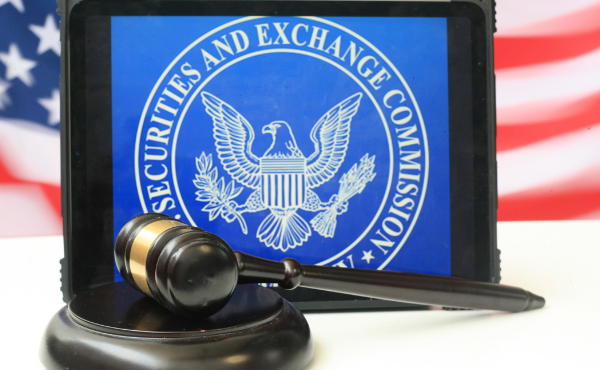Corporate Governance in the United States


The sources of corporate governance law and regulation in the United States are varied and interrelated. There are four key sources: state corporate law (predominantly Delaware, in which over half of all US publicly traded corporations are incorporated); the federal 1933 Securities Act and 1934 Securities Exchange Act, and the regulations of the Securities and Exchange Commission (SEC) under those Acts; stock exchange listing rules (predominantly the New York Stock Exchange (NYSE) and the NASDAQ); and federal statutes in regard to particular areas of corporate practice (e.g., regulations promulgated by the Federal Reserve and other federal and state agencies with respect to banks and other financial institutions, and by other similar regulatory bodies in respect of communications, transportation and other regulated fields). Because of the federal system of US law, different sources of law are not always harmonised, and corporations are often subject to different obligations to federal and state governments, regulators at each level of government and demands of other relevant bodies, such as the applicable stock exchange. This mosaic of rules and regulations, and the mechanisms by which they are implemented and enforced, make for an environment of frequent change and evolution.
In addition, of increasing importance to the US corporate governance regime are the proxy advisory firms (predominantly Institutional Shareholder Services (ISS) and, with lower market share, Glass, Lewis & Co (Glass Lewis)) and the influence those proxy advisers have on the institutional investor community, and the related prevailing and evolving views of the institutional investor community. That community's views have become particularly influential as the shareholder base of the vast majority of US publicly traded corporations consists of an overwhelming majority of institutional shareholders, including index funds, pension funds and mutual funds. As a result, major institutional investors are increasingly developing their own independent views on preferred governance practices.
Securities laws and regulations are civilly enforced by the SEC, and the SEC must also grant clearance to certain important corporate disclosure documents (such as proxy statements and certain securities registration statements). Larger and older corporations with a history of securities law compliance are subject to fewer such pre-clearance requirements and may in certain cases file abbreviated forms of disclosure. Private investors may also bring actions under many provisions of the securities laws to recover damages for misstatements or omissions in public statements and in certain other circumstances. The Department of Justice prosecutes criminal violations of federal securities laws and SEC rules.
State law fiduciary duties of directors and officers are predominantly enforced by private actions led by plaintiffs' lawyers. These private actions generally fall into one of two categories: class-action suits on behalf of a particular group of the corporation's shareholders (typically all shareholders who bought or sold during a particular period or all unaffiliated shareholders), and derivative suits purportedly on behalf of the corporation itself. Putative class-action suits must satisfy the criteria under the Federal Rules of Civil Procedure or analogous provisions of state law before being permitted to proceed as a class action, including the numerousness of the class members, the commonality of legal and factual issues among members of the class, the typicality of the claims or defences of the representative parties to the class, and the fairness and adequacy of the representative parties' protection of the class interests. Derivative suits, creatures of state corporate law, provide a mechanism by which shareholder plaintiffs can in theory represent the corporation in suing the corporation's own board of directors or management, sometimes after complying with a 'demand' procedure in which the plaintiff must request that the corporation file suit and be rebuffed. In certain circumstances, especially when it can be shown that the board of directors is for some reason conflicted with respect to the alleged breach of duty, this demand requirement is excused and the shareholder will be permitted to pursue a claim in the corporation's name without further enquiry.
The two primary US stock exchanges, the NYSE and the NASDAQ, each make rules with which corporations must comply as a condition to being listed on these exchanges. These listing rules address all aspects of corporate governance, including topics such as director independence, the composition of various board committees, requirements to submit certain matters to a vote of shareholders, regulation of dual-class stock structures and other special voting rights, publication of and topics covered by corporate governance guidelines, and even requirements related to the corporation's public website. These rules are enforced by the threat of public reprimand from the exchanges, temporary suspension of trading for repeat offences and permanent delisting for perennially or egregiously non-compliant companies.
While proxy advisory firms are not a source of law, their guidelines figure significantly in the corporate governance landscape. ISS has been estimated to control approximately 61 per cent of the proxy advisory market, with Glass Lewis estimated to control approximately 36 per cent. These advisory firms exert pressure on corporations to conform to governance standards they promulgate by issuing director election voting recommendations to each publicly traded corporation's shareholders based on the corporation's compliance with the advisory firm's published standards. Perhaps because of the problem of rational apathy – that is, because an individual shareholder bears all of the costs of becoming an informed voter but shares the benefits with all other shareholders, shareholders have little incentive to inform themselves – proxy advisory firms wield outsized influence on corporate elections, especially among institutional investors such as pension funds.2 One study found that a recommendation from ISS to withhold a favourable vote in an uncontested director election correlates with a 20.9 per cent decline in favourable voting.3 In addition, a 2013 study sponsored by Stanford University found that companies were altering their compensation programmes to comply with proxy advisory firms' ever-evolving policies.4 The US Congress, the US Department of Labor and the SEC have raised questions regarding fiduciary responsibility in the context of the outsourcing of proxy voting decisions to proxy advisory firms. Significantly, certain major institutional investors, such as BlackRock Inc (which invests over US$6.3 trillion in client assets) and the Vanguard Group (which invests over US$5.1 trillion in client assets) have stated that they reach proxy voting decisions on the basis of their own internally developed guidelines, independent of proxy advisory firms, and have sought to engage directly and pragmatically with companies. These major institutions are uniquely positioned to use their influence to recalibrate the system to reduce reliance on proxy advisory firms.
The Dodd-Frank Wall Street Reform and Consumer Protection Act (Dodd-Frank Act), signed into law in July 2010, was passed in response to corporate governance practices perceived by some to have contributed to the 2008–2010 economic crisis. The Dodd-Frank Act requires additional disclosure in corporate proxies and non-binding shareholder votes on various questions of corporate governance (notably, related to executive compensation), and contemplates greater access for shareholder-proposed director nominees to the company proxy. More recently, in response to increasing company compliance costs, in 2018 the SEC adopted rule amendments to streamline disclosure requirements and reduce duplicative or overlapping disclosure obligations.
.....
Resources:
For further information on corporate governance in the United States consult https://thelawreviews.co.uk/edition/the-corporate-governance-review-edition-9/1189471/united-states
.....
Contact
100 F Street, NE
Washington, DC 20549


























